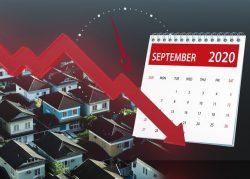Homebuilders’ faith in the housing market continues to reach new heights, even as the country braces itself for a second wave of coronavirus infections.
The National Association of Home Builders/Wells Fargo Housing Market Index reached 90 in November, seasonally adjusted, which breaks the record for the index’s highest reading in its 35-year history.
It’s the third consecutive month that the NAHB index has broken a record. In October, it hit a high of 85. The index has been steadily rising since bottoming out in April, as the onset of the pandemic shuttered many regions across the country.
Read more



The index tracks homebuilder confidence in current and future single-family home sales and traffic of potential homebuyers on a monthly basis. A reading of more than 50 indicates a positive outlook; a reading under 50 indicates a negative outlook.
In November, homebuilder sentiment toward home sales hit 96, setting a new high for the year; last month, the reading was 90. The outlook for home sales in six months moved to 89 from 88 in October. Activity among would-be homebuyers jumped to 77 from 74.
Regional sentiment followed the national index, except in the northeast, where sentiment dropped to 82, seasonally adjusted, from 87 the previous month.
Compared to 2019 readings, however, all components and regions tracked by NAHB’s indices reported significant increases year-over-year. The housing market’s strength in 2020 has been attributed to a combination of pent-up demand from homebuyers unable to transact during the initial months of the pandemic, low mortgage rates and historically low levels of inventory.
Economists say the housing market’s performance this year is largely attributed to high-income homebuyers, unaffected by the pandemic’s restrictions.
But that strong performance is starting to waver. New home sales dipped in September, though prices continued to rise 4.5 percent. Pending home sales, or contract activity, also fell, which may indicate a coming decline in sales numbers.
The Mortgage Bankers Association’s weekly survey of applications for purchase mortgages has reported no growth in the past seven weeks, which the organization referred to as a “slump” last week.
